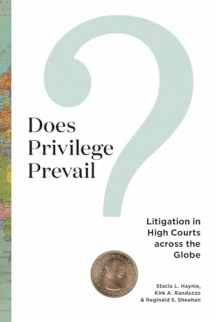
Does Privilege Prevail?: Litigation in High Courts across the Globe (Constitutionalism and Democracy)
Book details
Summary
Description
The first transnational comparative study of legal party capability theory
Justice is supposed to be blind. Cynics will say they know better. But what do the facts say? This groundbreaking study provides objective, data-driven answers to long-standing questions about winners and losers in courtrooms across the world. Does the party with the greater resources, such as money and influence, always prevail--and if so, why? Does Privilege Prevail? is the first book to evaluate these questions using a multi-country approach and, in doing so, assess what legal professionals and political scientists call party capability theory.
Stacia Haynie, Kirk Randazzo, and Reginald Sheehan analyze over fifteen thousand litigation outcomes of the high courts of six countries--Australia, Canada, India, the Philippines, South Africa, and the United Kingdom--from 1970 to 2000. This unprecedented trove of data reveals that while the "haves" of society do undoubtedly enjoy certain advantages in the judicial system, a more complex explanation for legal outcomes is required than party capability theory provides--especially when it comes to assessing the role of attorneys and their legal teams or the components of the docket where judges can provide avenues for the "have nots" to succeed.


We would LOVE it if you could help us and other readers by reviewing the book
Book review



